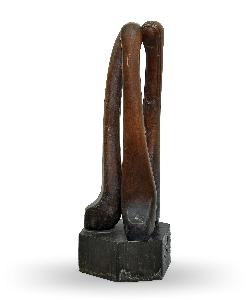Khaleel Al-Ward
Khaleel Al-Ward
Place: Najaf
Born: 1925
Death: 1995
Biography:
was a renowned Iraqi sculptor and painter, born in Najaf, Iraq in 1925 and died in 1995. He is known for his abstract works, which often explored themes of identity, culture, and history. Al-Ward studied at the Institute of Fine Arts in Baghdad and later at the Royal College of Art in London, where he honed his skills and developed his unique style.
Early Life and Education
Khaleel Al-Wardwas born into a family of artists and was encouraged to pursue his passion for art from a young age. He began his formal training at the Institute of Fine Arts in Baghdad, where he studied sculpture and painting. Later, he moved to London to continue his studies at the Royal College of Art, where he was exposed to various artistic styles and techniques.
Artistic Career
Al-Ward's artistic career spanned several decades and was marked by numerous solo and group exhibitions in Iraq and abroad. He was a member of the Baghdad Group for Contemporary Art, a collective of Iraqi artists who sought to promote modern and contemporary art in Iraq. Al-Ward's work often featured traditional Iraqi motifs and symbols, which he incorporated into his abstract compositions. Some of Khaleel Al-Ward's notable works include Southern Iraqi Women, a sculpture created in 1969, which is considered one of his most famous pieces. His work can be found in various museums and collections, including the UCL Art Museum in London.
Awards and Recognition
Khaleel Al-Wardreceived several awards for his contributions to Iraqi art, including the Iraqi Ministry of Culture's Award for Fine Arts in 1971. His work has been exhibited in numerous museums and galleries, including the Musee de Region Auguste Chabaud in France and the Washington University Gallery of Art in the United States.
- Notable works: Southern Iraqi Women, Oval Form (Trezion) by Dame Barbara Hepworth
- Awards: Iraqi Ministry of Culture's Award for Fine Arts in 1971
- Museums and collections: UCL Art Museum, Musee de Region Auguste Chabaud, Washington University Gallery of Art
's legacy as a sculptor and painter continues to inspire artists and art enthusiasts around the world. His unique style, which blended traditional Iraqi motifs with modern abstract techniques, has left an indelible mark on the art world. For more information about Khaleel Al-Ward and his work, visit https://Wikioo.org/@/Khaleel-Al-Ward.




